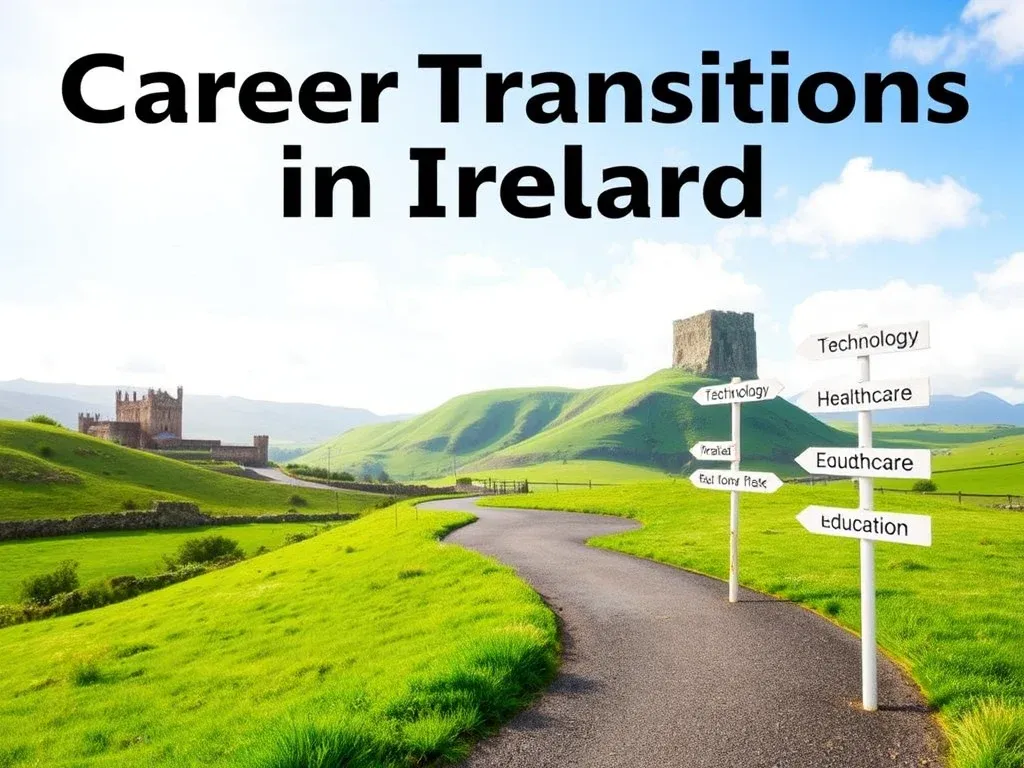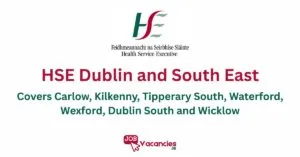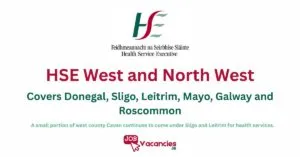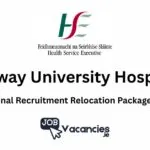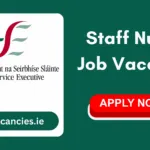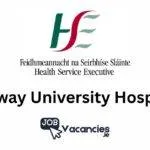Table of Contents
- Table of Contents
- Introduction
- Pro Tip
- Understanding Career Transitions in Ireland
- The Changing Nature of Careers
- Types of Career Transitions
- The Irish Context: Opportunities and Challenges
- Pro Tip
- Self-Assessment: Skills, Values, and Interests
- The Foundation of Successful Transitions
- Skills Inventory
- Values Clarification
- Interest Exploration
- Assessment Tools and Resources in Ireland
- Translating Self-Assessment to Career Options
- Pro Tip
- The Irish Job Market: Growth Sectors and Opportunities
- Current Landscape and Trends
- High-Growth Sectors for Career Transitions
- Emerging Opportunities and Niche Markets
- Regional Considerations
- Pro Tip
- Education and Upskilling Pathways
- The Irish Education Landscape for Career Changers
- Formal Education Options
- Government-Supported Initiatives
- Professional Certifications and Industry Qualifications
- Alternative Learning Pathways
- Funding Your Education
- Pro Tip
- Leveraging Transferable Skills
- The Power of Transferable Skills in Career Transitions
- Identifying Your Transferable Skills
- High-Value Transferable Skills in the Irish Job Market
- Translating Skills Across Industries
- Common Skill Translation Scenarios in Ireland
- Demonstrating Transferable Skills to Irish Employers
- Pro Tip
- Networking for Career Changers
- The Critical Role of Networking in Irish Career Transitions
- Building a Strategic Networking Plan
- Leveraging Existing Networks
- Expanding Your Network in Ireland
- Informational Interviews: A Key Transition Tool
- Building Credibility Through Participation
- Networking Across Cultures in Ireland
- Pro Tip
- CV and Interview Strategies for Career Changers
- The Career Changer’s Application Challenge
- CV Strategies for Irish Career Changers
- Cover Letter Approaches
- Interview Preparation for Career Changers
- Irish Interview Considerations
- Pro Tip
- Financial Planning During Career Transitions
- The Financial Dimension of Career Changes
- Assessing the Financial Impact
- Creating a Transition Budget
- Funding Strategies for Irish Career Changers
- Managing Debt and Credit
- Housing Considerations
- Long-Term Financial Planning
- Support Systems for Career Transitions
- Professional Support Networks
- Government Resources
- Personal Support Systems
- Digital Tools and Resources
- Conclusion
- Key Takeaways
- Related Posts
Career Transitions in Ireland: Navigating Your Professional Path
Reading time: 15 minutes
Whether you’re seeking new challenges, responding to industry changes, or pursuing greater fulfillment, changing careers in Ireland requires careful planning and strategic action. This comprehensive guide explores the Irish career transition landscape, offering practical advice on skills assessment, education pathways, networking strategies, and navigating the job market to help you successfully chart your new professional course.
Introduction
Career transitions have become increasingly common in today’s dynamic professional landscape. In Ireland, economic shifts, technological advancements, and evolving workplace expectations have created both challenges and opportunities for those considering a career change. Whether you’re moving between industries, shifting roles within your field, or completely reinventing your professional identity, navigating a career transition requires careful planning, strategic networking, and a clear understanding of the Irish employment landscape.
The good news is that Ireland’s diverse and growing economy offers numerous pathways for career changers. With strong sectors in technology, pharmaceuticals, financial services, healthcare, and green energy, professionals have various options for redirecting their careers toward industries with promising futures. Additionally, Ireland’s robust education system and government-supported upskilling initiatives provide valuable resources for acquiring new qualifications and competencies.
This guide is designed to help you navigate every stage of your career transition journey in Ireland—from initial self-assessment and exploration to education planning, job search strategies, and successful integration into your new field. By understanding the unique aspects of career transitions in the Irish context and following a structured approach, you can transform professional challenges into opportunities for growth and fulfillment.
Pro Tip
Before making any major career decisions, conduct informational interviews with professionals already working in your target field in Ireland. These conversations can provide invaluable insights into industry-specific challenges, required qualifications, and hidden opportunities that general research might not reveal. Most Irish professionals are willing to share their experiences over a coffee or virtual meeting if approached respectfully and with clear objectives.
Understanding Career Transitions in Ireland
The Changing Nature of Careers
The concept of a single lifelong career has largely disappeared in Ireland, as in most developed economies. Today’s professionals can expect to change careers—not just jobs—multiple times throughout their working lives. This shift reflects broader economic and technological transformations that have disrupted traditional career paths while creating new opportunities in emerging fields.
In Ireland specifically, several factors have contributed to increased career mobility:
- Economic diversification: Ireland’s transition from an agriculture-based economy to a knowledge and service economy has created new sectors and roles.
- Multinational presence: The strong presence of international companies has introduced global career paths and cross-industry mobility.
- Technological advancement: Digital transformation has both eliminated traditional roles and created entirely new career categories.
- Changing work values: Irish professionals increasingly prioritize purpose, work-life balance, and personal fulfillment over traditional career progression.
Types of Career Transitions
Career transitions in Ireland typically fall into several categories, each with distinct challenges and strategies:
- Industry transitions: Moving between sectors (e.g., from financial services to healthcare) while potentially maintaining similar functional expertise.
- Functional transitions: Changing your role or specialization while remaining in the same industry (e.g., transitioning from marketing to human resources within the tech sector).
- Entrepreneurial transitions: Moving from employment to self-employment or starting a business.
- Advancement transitions: Significant upward movement that requires new skills and responsibilities (e.g., moving from individual contributor to management).
- Work model transitions: Shifting between different work arrangements (e.g., from traditional employment to freelancing or remote work).
The Irish Context: Opportunities and Challenges
Ireland offers several advantages for career changers:
- Strong economy: Despite global economic fluctuations, Ireland has maintained relatively strong economic performance, creating opportunities across multiple sectors.
- Skills shortages: Many industries in Ireland face skills gaps, creating openings for career changers willing to acquire in-demand competencies.
- Education access: Ireland’s extensive continuing education options, including part-time degrees, online courses, and professional certifications, support mid-career learning.
- Government initiatives: Programs like Springboard+ and the Human Capital Initiative provide funded education opportunities specifically designed for career changers and those upskilling.
However, career changers in Ireland also face distinct challenges:
- Credential emphasis: Irish employers often place significant weight on formal qualifications and specific credentials.
- Regional disparities: Career opportunities vary significantly between Dublin and other regions, potentially requiring relocation.
- Network importance: The relatively small size of the Irish professional community means that personal connections often play a crucial role in career advancement.
- Cost of living: High housing and living costs, particularly in Dublin, can make extended periods of reduced income during transition challenging.
Pro Tip
When researching potential career paths in Ireland, pay attention to both national and regional economic development plans. Agencies like IDA Ireland, Enterprise Ireland, and Regional Skills Forums regularly publish information about sectors being strategically developed in different parts of the country. Aligning your career transition with these priority areas can increase your chances of finding support, training opportunities, and eventual employment.
Self-Assessment: Skills, Values, and Interests
The Foundation of Successful Transitions
Before exploring specific career options in Ireland, a thorough self-assessment provides the foundation for making informed decisions. This process involves examining your skills, values, interests, and motivations to identify potential career paths that align with your unique profile and aspirations.
Skills Inventory
Begin by cataloging your current skills across three categories:
- Technical skills: Specific abilities related to your profession or industry (e.g., programming languages, financial analysis, project management methodologies).
- Transferable skills: Capabilities that can be applied across different roles and industries (e.g., communication, problem-solving, leadership, data analysis).
- Soft skills: Interpersonal and behavioral attributes that influence how you work and interact with others (e.g., emotional intelligence, adaptability, teamwork).
For each skill, assess your proficiency level and consider how it might translate to different contexts. Irish employers increasingly value transferable skills that demonstrate adaptability in a changing workplace.
Values Clarification
Understanding your core values helps identify work environments and roles where you’ll thrive. Consider:
- Work-related values: What aspects of work matter most to you? (e.g., autonomy, creativity, security, recognition, social impact)
- Lifestyle values: How does work fit into your broader life priorities? (e.g., work-life balance, location, travel opportunities)
- Ethical values: What types of organizations and missions align with your personal ethics?
The Irish workplace offers diverse cultures—from the fast-paced environment of multinational tech companies to the community-focused approach of public service or non-profit organizations.
Interest Exploration
Identifying genuine interests can guide you toward fulfilling career options:
- Subject interests: What topics, fields, or industries naturally engage your curiosity?
- Activity preferences: What types of tasks energize rather than drain you?
- Work environment preferences: In what settings do you perform best? (e.g., structured vs. flexible, collaborative vs. independent)
Assessment Tools and Resources in Ireland
Several Irish-specific resources can support your self-assessment process:
- Career guidance services: The Adult Educational Guidance Initiative (AEGI) offers free career guidance services through Education and Training Boards nationwide.
- Online assessment tools: Websites like Careers Portal and Qualifax offer career interest assessments tailored to the Irish context.
- Professional career coaching: The Irish branch of the International Coaching Federation can help you find qualified career coaches specializing in transitions.
- University career services: Many Irish universities offer career assessment services to alumni as well as current students.
Translating Self-Assessment to Career Options
After completing your self-assessment, the next step is connecting your profile to potential career paths in Ireland. Consider:
- Researching careers that match your strongest skills and interests using resources like the Skills Ireland website.
- Identifying roles where your transferable skills would be particularly valuable.
- Exploring industries aligned with your values and work preferences.
- Considering how your unique combination of experiences and abilities might address specific needs in the Irish job market.
Pro Tip
Create a “career transition journal” to document your self-assessment insights, research findings, and reflections throughout your journey. This practice not only helps organize your thoughts but also allows you to track your evolving priorities and discoveries. When facing difficult decisions or moments of doubt, reviewing your journal can reconnect you with your core motivations and the thoughtful process behind your career change.
The Irish Job Market: Growth Sectors and Opportunities
Current Landscape and Trends
Understanding the structure and dynamics of the Irish job market is essential for identifying viable transition opportunities. Ireland’s economy has undergone significant transformation in recent decades, evolving from agriculture and traditional manufacturing toward knowledge-intensive industries and services.
Key characteristics of the current Irish job market include:
- Strong FDI influence: Foreign Direct Investment, particularly from US multinationals, continues to shape the employment landscape.
- Regional development focus: Government initiatives aim to distribute economic growth beyond Dublin through regional development plans.
- Skills mismatches: Despite overall economic strength, skills gaps exist in specific sectors, creating opportunities for those willing to upskill.
- Increasing flexibility: Remote work, hybrid arrangements, and contract positions have become more prevalent, offering alternative entry points for career changers.
High-Growth Sectors for Career Transitions
Several sectors in Ireland offer particularly promising opportunities for career changers due to their growth trajectories, skills demands, and openness to non-traditional backgrounds:
Technology and Digital
- Software development: Continued demand for developers across experience levels, with many companies offering conversion programs for career changers.
- Cybersecurity: Critical skills shortage creating opportunities for those with analytical backgrounds from other fields.
- Data analytics and AI: Growing rapidly with pathways for those with quantitative skills from finance, research, or other analytical fields.
- Digital marketing: Accessible entry point for those with communication backgrounds or creative skills.
Healthcare and Life Sciences
- Pharmaceutical manufacturing: Ireland’s position as a global pharma hub creates diverse roles beyond scientific positions.
- Medical technology: Growing sector at the intersection of healthcare and technology.
- Healthcare administration: Increasing complexity in healthcare systems creates demand for management and operational expertise.
- Mental health services: Expanding area with opportunities for those with backgrounds in education, HR, or social services to retrain.
Green Economy and Sustainability
- Renewable energy: Ireland’s commitment to renewable energy transition creates roles in project management, community engagement, and technical implementation.
- Sustainable construction: Growing demand for expertise in green building practices and energy efficiency.
- Environmental compliance: Regulatory requirements create opportunities for those with legal, quality assurance, or administrative backgrounds.
- Circular economy initiatives: Emerging area with diverse roles in logistics, design, and business model innovation.
Financial Services and Fintech
- Regulatory compliance: Brexit-related relocations and increasing regulation have amplified demand for compliance professionals.
- Financial technology: Ireland’s growing fintech sector offers roles spanning technology, customer experience, and financial expertise.
- Sustainable finance: Emerging specialization combining financial knowledge with sustainability principles.
- Risk management: Accessible to those with analytical backgrounds from various industries.
Emerging Opportunities and Niche Markets
Beyond the major growth sectors, several specialized areas offer interesting transition opportunities:
- Language-based roles: Ireland’s position as a European hub creates demand for professionals combining language skills with other expertise.
- Creative industries: Film, animation, and gaming sectors have grown significantly with government support.
- Agtech and food innovation: Ireland’s agricultural heritage combined with technology focus creates unique opportunities.
- Education technology: Growing sector leveraging Ireland’s strong education reputation and tech capabilities.
Regional Considerations
Career opportunities vary significantly across different regions of Ireland:
- Dublin: Highest concentration of multinational employers and startups, particularly in technology, financial services, and professional services.
- Cork: Strong in pharmaceuticals, medical technology, and cybersecurity with a growing startup ecosystem.
- Galway: Medical technology hub with growing technology presence.
- Limerick/Shannon: Aviation, manufacturing, and technology with significant recent investment.
- Waterford/Southeast: Emerging focus on financial services, pharmaceutical, and technology sectors.
- Border counties: Unique cross-border opportunities with Northern Ireland, particularly in areas like agri-food and tourism.
Pro Tip
Follow publications like the Skills Bulletin from the Expert Group on Future Skills Needs and reports from IDA Ireland to identify specific roles experiencing skills shortages. These documents often highlight not just industries but specific job functions where demand exceeds supply, providing valuable intelligence for targeting your transition. Additionally, the government’s National Skills Strategy outlines priority areas receiving educational investment and support.
Education and Upskilling Pathways
The Irish Education Landscape for Career Changers
Ireland offers a diverse range of education and training options specifically designed to support career transitions. Understanding these pathways can help you identify the most efficient route to acquiring the qualifications needed for your target career.
Formal Education Options
Conversion Master’s Programs
Irish universities and institutes of technology offer specialized conversion master’s degrees designed specifically for career changers. These intensive programs typically:
- Require no prior experience in the field
- Condense foundational knowledge into 1-2 years of study
- Often include industry placements or projects
- Focus on high-demand areas like computing, data analytics, and healthcare
Popular examples include:
- MSc in Computer Science (Conversion) at various universities
- MSc in Data Analytics for Business at UCD
- MSc in Digital Marketing at TU Dublin
- Higher Diploma in Science in Computing at NUI Galway
Part-Time and Flexible Degree Programs
Many Irish higher education institutions have developed flexible study options specifically for working professionals:
- Evening and weekend classes
- Blended learning combining online and in-person elements
- Modular programs allowing step-by-step qualification building
- Extended timeframes for completion to accommodate work commitments
Higher Certificates and Diplomas
Shorter qualifications (typically 1-2 years) that provide focused professional training:
- Higher Certificates (Level 6 on the National Framework of Qualifications)
- Ordinary Bachelor Degrees (Level 7)
- Higher Diplomas (Level 8)
These can offer faster routes into new fields without committing to a full degree program.
Government-Supported Initiatives
Springboard+
This government initiative offers free or heavily subsidized courses in areas of skills shortage to unemployed people, returners to the workforce, and those seeking to upskill in their current field. Key features include:
- Courses ranging from certificate to master’s level
- Focus on in-demand skills in growing sectors
- 90% funding for employed participants, 100% for unemployed
- Flexible delivery formats including part-time and online options
Human Capital Initiative
This program funds additional higher education places in priority skills areas:
- Focus on innovation and agility
- Emphasis on enterprise partnerships and work-based learning
- Targets areas like digital skills, green skills, and future manufacturing
Skillnet Ireland
Industry-led training networks that deliver specialized training:
- Over 70 networks across different sectors and regions
- Programs designed with direct industry input
- Often include pathways for career changers entering the sector
- Combination of technical skills and industry-specific knowledge
Professional Certifications and Industry Qualifications
Many fields offer professional certifications that can provide recognized credentials in less time than formal degrees:
- IT certifications: Industry-recognized qualifications from providers like Microsoft, Cisco, and AWS
- Financial certifications: Qualifications from bodies like ACCA or CFA that can be completed while working
- Project management: Credentials like PRINCE2, PMP, or Scrum Master certification
- Digital marketing: Specialized certifications from Google, HubSpot, and other platforms
Alternative Learning Pathways
Coding Bootcamps and Intensive Training
Accelerated programs focused on practical skills development:
- Typically 12-16 weeks of intensive training
- Focus on job-ready skills with portfolio development
- Often include career services and employer connections
- Examples include Code Institute, Digital Skills Academy, and Software Design Academy
Apprenticeships and Earn-While-You-Learn
Ireland has expanded its apprenticeship model beyond traditional trades to include white-collar professions:
- New apprenticeships in areas like insurance, accounting, ICT, and financial services
- Combine workplace learning with formal education
- Lead to recognized qualifications while earning a salary
- Increasingly open to career changers, not just school leavers
Funding Your Education
Several options exist to help finance your education during a career transition:
- Back to Education Allowance: Social welfare payment for unemployed people returning to education
- Tax relief on tuition fees: Available for approved courses at recognized institutions
- Employer funding: Some employers offer education assistance even for skills outside your current role
- Professional development loans: Specialized loan products for career development
- Education assistance from industry bodies: Grants and scholarships from professional associations
Pro Tip
Before committing to any education program, research its employment outcomes specifically for career changers. Request data on placement rates for graduates without prior experience in the field, and ask to connect with alumni who successfully transitioned from backgrounds similar to yours. The most valuable programs maintain strong industry connections and adapt their curriculum regularly to meet evolving employer needs.
Leveraging Transferable Skills
The Power of Transferable Skills in Career Transitions
One of the most valuable assets in a career transition is the set of transferable skills you’ve developed throughout your professional life. These capabilities—which can be applied across different roles, industries, and contexts—form bridges between your past experience and future career, reducing the perceived risk for potential employers and shortening your transition timeline.
Identifying Your Transferable Skills
Many professionals underestimate the portability of their skills. To identify your transferable capabilities:
- Review your achievements: Analyze your major professional accomplishments to identify the underlying skills that made them possible.
- Seek external perspective: Ask colleagues, managers, or mentors what they see as your standout capabilities.
- Consider feedback patterns: Look for themes in performance reviews or informal feedback you’ve received.
- Reflect on challenges overcome: The difficulties you’ve successfully navigated often reveal your most developed skills.
High-Value Transferable Skills in the Irish Job Market
While valuable transferable skills vary by target industry, several capabilities are consistently prized across the Irish business landscape:
Communication and Relationship Skills
- Stakeholder management: The ability to identify, engage, and influence diverse stakeholders
- Cross-cultural communication: Particularly valuable in Ireland’s multinational environment
- Presentation and persuasion: Articulating complex ideas clearly to different audiences
- Negotiation: Finding mutually beneficial solutions in challenging situations
Analytical and Problem-Solving Skills
- Critical thinking: Evaluating information objectively and identifying logical connections
- Data interpretation: Drawing meaningful insights from quantitative and qualitative information
- Systems thinking: Understanding how different components interact within complex systems
- Creative problem-solving: Developing innovative solutions to challenging problems
Project and Process Skills
- Project management: Planning, executing, and closing projects efficiently
- Process improvement: Identifying inefficiencies and implementing enhancements
- Resource allocation: Optimizing the use of time, budget, and human resources
- Risk management: Anticipating potential issues and developing mitigation strategies
Adaptability and Learning Skills
- Change management: Navigating transitions effectively at personal and organizational levels
- Learning agility: Quickly acquiring and applying new knowledge
- Digital adaptability: Embracing and leveraging new technologies
- Resilience: Maintaining effectiveness during uncertainty and setbacks
Translating Skills Across Industries
The key to leveraging transferable skills is effectively translating them into the language and context of your target industry. For each relevant skill:
- Research industry applications: Understand how your skill manifests in your target field
- Identify shared challenges: Find problems in your target industry that resemble those you’ve solved previously
- Learn industry terminology: Reframe your capabilities using sector-specific language
- Quantify impact: Where possible, measure your skills through relevant metrics
Common Skill Translation Scenarios in Ireland
From Traditional Business to Tech
- Customer service → User experience: Understanding user needs and pain points
- Process management → Agile methodologies: Structured approaches to project delivery
- Business analysis → Product management: Translating business requirements into technical solutions
- Training → Technical documentation: Explaining complex concepts clearly
From Education to Corporate
- Curriculum development → Learning and development: Designing effective learning experiences
- Classroom management → Team leadership: Motivating groups toward common goals
- Student assessment → Performance evaluation: Providing constructive feedback for improvement
- Parent communication → Client relationship management: Managing expectations and building trust
From Corporate to Non-Profit
- Sales → Fundraising: Persuasive communication and relationship building
- Marketing → Advocacy: Creating compelling narratives for important causes
- Financial analysis → Grant management: Ensuring responsible resource allocation
- Corporate strategy → Program development: Aligning activities with organizational mission
Demonstrating Transferable Skills to Irish Employers
To effectively showcase your transferable skills:
- Use concrete examples: Provide specific instances where you’ve applied these skills successfully
- Create skill bridges: Explicitly connect past achievements to future contributions
- Develop proof points: Where possible, create demonstrations of your skills applied to your target field
- Leverage recommendations: Seek endorsements that highlight your most relevant transferable capabilities
Pro Tip
Create a “skills translation document” specifically for your target industry. For each key transferable skill, document: (1) how you’ve demonstrated it in your previous roles, (2) how this skill is applied in your target field (using industry-specific terminology), and (3) how your unique application of this skill could add value in the new context. This document serves as both a personal reference for interviews and a foundation for customizing application materials.
Networking for Career Changers
The Critical Role of Networking in Irish Career Transitions
In Ireland’s relatively small professional community, networking plays an outsized role in career transitions. Personal connections can provide insider information, facilitate introductions, and help you overcome the credibility gap that career changers often face. While this emphasis on relationships can initially seem challenging, it also creates opportunities to bypass traditional hiring barriers through meaningful professional connections.
Building a Strategic Networking Plan
Effective networking for career transitions requires a structured approach:
- Set clear objectives: Define what specific information, connections, or opportunities you’re seeking
- Identify key stakeholders: Map out the people and organizations most relevant to your transition
- Develop your narrative: Craft a compelling story about your career change that emphasizes continuity and purpose
- Create a consistent outreach cadence: Establish regular networking activities rather than sporadic efforts
Leveraging Existing Networks
Begin your networking efforts with connections you already have:
- Professional inventory: Systematically review past colleagues, classmates, and professional contacts
- Second-degree connections: Identify who in your network might know people in your target field
- Alumni networks: Connect with graduates from your educational institutions working in your desired industry
- Industry-adjacent contacts: Reach out to people who work with your target industry (suppliers, clients, partners)
Expanding Your Network in Ireland
Professional Associations and Industry Bodies
Most Irish industries have professional organizations that welcome prospective entrants:
- Attend open events and webinars as an introduction to the community
- Look for mentoring programs specifically for career changers
- Volunteer for committees or working groups to demonstrate commitment
- Participate in special interest groups aligned with your transferable skills
Networking Events and Conferences
Ireland hosts numerous industry events that provide networking opportunities:
- Industry conferences: Major gatherings like Dublin Tech Summit or FutureScope
- Meetup groups: Informal communities organized around specific interests or technologies
- Chamber of Commerce events: Business networking across multiple sectors
- Career fairs: Opportunities to connect directly with hiring managers and recruiters
Online Networking Platforms
Digital channels offer efficient ways to build relevant connections:
- LinkedIn: The primary professional networking platform in Ireland
- Twitter: Valuable for engaging with thought leaders in many industries
- Industry-specific forums: Online communities focused on particular sectors
- Alumni platforms: Digital networks maintained by educational institutions
Informational Interviews: A Key Transition Tool
Informational interviews—conversations with professionals in your target field focused on gathering insights rather than securing job offers—are particularly valuable for career changers:
- Identifying interview targets: Seek diverse perspectives across roles, organizations, and career stages
- Making effective requests: Craft clear, concise outreach that respects the other person’s time
- Preparing thoughtful questions: Develop questions that demonstrate research while seeking genuine insights
- Following up meaningfully: Build ongoing relationships rather than transactional exchanges
Building Credibility Through Participation
Active engagement in your target industry can build visibility and credibility:
- Industry events: Volunteer at conferences or participate in panel discussions
- Content creation: Share insights through blog posts, articles, or social media
- Community projects: Contribute to open-source initiatives or community organizations
- Skill-sharing: Offer your existing expertise to build reciprocal relationships
Networking Across Cultures in Ireland
Ireland’s business community includes both distinctly Irish networking practices and international approaches:
- Relationship emphasis: Irish business culture values personal connection before transaction
- Conversational approach: Building rapport through general conversation often precedes business discussion
- Regional variations: Networking styles may differ between Dublin and other regions
- Industry differences: Traditional Irish industries may emphasize relationship-building more than multinational tech companies
Pro Tip
Create a “networking CRM” system to track your professional connections and follow-ups. For each meaningful contact, record key details about your conversations, their interests and expertise, and potential ways you might help each other. Set regular reminders to maintain these relationships with relevant updates or useful information sharing. Consistent, thoughtful follow-up distinguishes effective networkers from those who make initial connections but fail to develop them into valuable professional relationships.
CV and Interview Strategies for Career Changers
The Career Changer’s Application Challenge
Career changers face unique challenges in the application process. Traditional CVs and interview approaches often emphasize linear career progression and industry-specific experience—precisely what career changers may lack. However, with strategic presentation of your background and careful preparation, you can effectively position yourself as a valuable candidate despite non-traditional experience.
CV Strategies for Irish Career Changers
Choosing the Right CV Format
The format of your CV can significantly impact how employers perceive your transition:
- Skills-based/functional format: Organizes information around competencies rather than chronological history, highlighting transferable skills
- Hybrid format: Combines skills sections with a condensed work history, balancing skill emphasis with career continuity
- Targeted format: Tailors content specifically to each application, emphasizing most relevant experiences
Crafting an Effective Professional Summary
The professional summary or profile section is particularly important for career changers:
- Directly address your career transition with confidence
- Emphasize the deliberate nature of your career change
- Highlight the unique perspective your background brings
- Connect your previous experience to your target role
Showcasing Transferable Skills
Make your transferable skills explicit and relevant:
- Create dedicated skills sections organized by categories relevant to your target role
- Use industry-specific terminology from your target field
- Provide concrete examples of applying these skills in different contexts
- Quantify achievements where possible to demonstrate impact
Addressing Employment History
Present your work experience in ways that highlight relevance:
- Focus on achievements and responsibilities that relate to your target field
- Use language and framing that bridges your past experience with future roles
- Include relevant projects, temporary roles, or volunteer work alongside traditional employment
- Consider grouping similar roles to streamline your history if you have extensive experience
Education and Qualifications
Strategically present your learning journey:
- Highlight recent education and training related to your new field
- Include relevant certifications, courses, and self-directed learning
- Consider moving education higher on your CV if it’s more relevant than your work history
- Emphasize projects, assignments, or research that demonstrate practical application
Cover Letter Approaches
Cover letters offer valuable space to explain your transition narrative:
- Address the transition directly: Acknowledge your career change and frame it positively
- Explain your motivation: Share authentic reasons for your interest in the new field
- Connect past and future: Draw explicit links between previous experience and target role
- Demonstrate commitment: Highlight steps taken to prepare for this transition
- Show cultural fit: Express alignment with the organization’s values and mission
Interview Preparation for Career Changers
Anticipating Key Questions
Prepare thoroughly for questions that typically challenge career changers:
- “Why are you changing careers?”
- “How does your background prepare you for this role?”
- “What makes you qualified compared to candidates with direct experience?”
- “How do we know you won’t change direction again soon?”
- “How will you overcome your learning curve in this new field?”
Developing Your Transition Narrative
Craft a compelling story about your career change that emphasizes:
- Logical progression rather than abrupt shift
- Thoughtful decision-making process
- Connections between past achievements and future contributions
- Genuine passion for the new field backed by concrete actions
Demonstrating Industry Knowledge
Show that you’ve done your homework about your new field:
- Research industry trends, challenges, and terminology
- Follow key thought leaders and publications
- Understand the competitive landscape of your target company
- Prepare thoughtful questions that demonstrate engagement with industry issues
Addressing the Experience Gap
Proactively manage concerns about your lack of direct experience:
- Prepare specific examples of transferable skills in action
- Highlight relevant projects, volunteer work, or self-directed learning
- Discuss your learning strategy for quickly closing knowledge gaps
- Emphasize soft skills and adaptability that support rapid onboarding
Irish Interview Considerations
Be aware of specific aspects of the Irish interview context:
- Relationship emphasis: Irish interviews often include rapport-building alongside technical assessment
- Modesty balance: Irish culture values humility, but career changers need to confidently articulate their value
- Practical demonstration: Be prepared for skills tests, case studies, or practical exercises
- Cultural fit assessment: Many Irish employers place high value on team integration and cultural alignment
Pro Tip
Create a “career transition portfolio” that goes beyond your CV to demonstrate your readiness for your new field. This might include relevant projects (even self-initiated ones), certificates of completed courses, examples of problems you’ve solved using transferable skills, and testimonials from professionals in your target industry who can speak to your potential. Having this portfolio ready—either as a physical document or digital resource—allows you to provide concrete evidence of your capabilities during interviews or networking conversations.
Financial Planning During Career Transitions
The Financial Dimension of Career Changes
Career transitions often involve financial adjustments—whether temporary income reduction during retraining, relocation costs, or initial salary changes when entering a new field. In Ireland, where living costs (particularly housing) are high in major employment centers, careful financial planning is essential to ensure your career change is sustainable and successful.
Assessing the Financial Impact
Begin with a comprehensive assessment of your transition’s financial implications:
- Income changes: Potential salary differences in your new field, including starting at a more junior level
- Education costs: Tuition, materials, and potential income loss during study periods
- Transition period: Estimated time between leaving your current role and securing employment in your new field
- Long-term financial trajectory: Career progression and earning potential in your target field
Creating a Transition Budget
Develop a detailed budget specifically for your transition period:
- Essential expenses: Housing, utilities, food, healthcare, debt payments
- Transition-specific costs: Education, certifications, professional memberships, networking events
- Emergency fund: Sufficient savings to cover unexpected costs during your transition
- Timeline mapping: Aligning financial resources with each stage of your transition plan
Funding Strategies for Irish Career Changers
Government Supports
Ireland offers several programs that can provide financial assistance during career transitions:
- Back to Education Allowance (BTEA): Social welfare payment for unemployed people, lone parents, and people with disabilities who are returning to education
- Education Training Board (ETB) programs: Free or low-cost courses in various vocational areas
- Springboard+ and Human Capital Initiative: Free or subsidized courses in areas of skills shortage
- Part-Time Education Option: Allows certain jobseekers to retain benefits while studying part-time
Tax Benefits
The Irish tax system offers some relief for education expenses:
- Tax relief on tuition fees: Available at the standard rate for approved courses at recognized institutions
- Tax-free employer support: Up to €5,000 per year for job-related education may be provided by employers without benefit-in-kind tax
Phased Transitions
Consider approaches that allow gradual career change while maintaining financial stability:
- Part-time study while working: Maintaining income while acquiring new qualifications
- Internal transitions: Moving to a new role within your current organization
- Side projects: Building experience in your target field through freelance or volunteer work
- Reduced hours: Negotiating part-time arrangements in your current role to create space for transition activities
Managing Debt and Credit
Debt management requires special attention during career transitions:
- Existing debt review: Assess current obligations and consider consolidation or refinancing options
- Strategic use of credit: Carefully evaluate when borrowing for education or transition costs makes sense
- Credit score protection: Maintain good credit standing to preserve financial flexibility
- Education-specific loans: Explore specialized financing options for career development
Housing Considerations
Housing typically represents the largest expense for most people in Ireland:
- Location flexibility: Consider how your housing location affects commuting options and job opportunities
- Rent vs. buy decisions: Evaluate whether your career transition affects the stability needed for homeownership
- Downsizing opportunities: Temporary downsizing can free up resources during transition periods
- Remote work considerations: New remote work possibilities may open up more affordable housing locations
Pro Tip: Financial Planning
Create a dedicated “transition fund” separate from your emergency fund. Aim to save 3-6 months of expenses specifically earmarked for career transition costs like education, certification fees, or income gaps between positions. This provides financial security and reduces stress during the change process.
Long-Term Financial Planning
Career transitions should be considered within your broader financial life plan:
- Retirement planning adjustments: Update pension contributions and investment strategies
- Insurance coverage review: Ensure appropriate health, income protection, and other insurance
- Tax implications: Understand how career changes might affect your tax situation
- Financial advisor consultation: Consider professional advice for complex transitions
Support Systems for Career Transitions
Professional Support Networks
Accessing professional guidance can significantly improve transition outcomes:
- Career counselors: Specialized professionals who can provide structured guidance through transitions
- Industry mentors: Experienced professionals in your target field who can provide insider knowledge
- Professional associations: Industry groups that offer networking, resources, and continuing education
- Alumni networks: Connections from educational institutions that can provide advice and opportunities
Government Resources
Ireland offers several government-backed resources for career changers:
- Intreo services: The Department of Social Protection’s one-stop shop for employment and income supports
- Springboard+: Free or subsidized higher education courses for those seeking to upskill or reskill
- Skillnet Ireland: Enterprise-led learning networks providing training in various sectors
- Local Enterprise Offices: Support for those transitioning to entrepreneurship or self-employment
Personal Support Systems
The emotional aspects of career transitions should not be underestimated:
- Family and friends: Maintaining open communication with loved ones about your transition journey
- Peer support groups: Connecting with others experiencing similar transitions
- Mental health resources: Counseling or therapy to address transition-related stress or anxiety
- Work-life balance strategies: Techniques to maintain wellbeing during potentially stressful transitions
Pro Tip: Building Resilience
Career transitions rarely follow a linear path. Develop resilience by celebrating small wins, maintaining a growth mindset, and creating regular reflection practices. Consider keeping a transition journal to track your progress, insights, and emotional responses throughout the process. This can help you recognize patterns, identify effective strategies, and maintain perspective during challenging moments.
Digital Tools and Resources
Leverage technology to support your transition journey:
- Career assessment platforms: Online tools that help identify strengths, interests, and potential paths
- Job market analytics: Data-driven insights into industry trends and skill demands
- Learning platforms: Online courses and resources for skill development
- Productivity and organization tools: Apps and systems to manage the many tasks involved in a transition
Conclusion
Navigating career transitions in Ireland requires careful planning, self-awareness, and strategic action. While changes in professional direction can be challenging, they also represent opportunities for growth, fulfillment, and improved work-life alignment. By approaching transitions with intention and leveraging the resources available in the Irish context, you can transform career change from a potentially disruptive event into a positive catalyst for professional and personal development.
Key Takeaways
- Self-assessment forms the foundation of successful career transitions, helping you identify directions aligned with your skills, values, and interests.
- Understanding the Irish job market, including growth sectors and regional opportunities, allows you to target your transition efforts effectively.
- Education and upskilling pathways in Ireland offer numerous options for developing the qualifications needed for your target career.
- Strategic networking and personal branding are essential for accessing opportunities and establishing credibility in a new field.
- Financial planning provides the security and flexibility needed to navigate transitions with confidence.
- Support systems—professional, governmental, and personal—can provide crucial guidance and encouragement throughout the transition process.
Remember that career transitions are increasingly common in today’s dynamic work environment. With thoughtful preparation and the right resources, your career change can lead to greater professional satisfaction and success in Ireland’s evolving economy.
